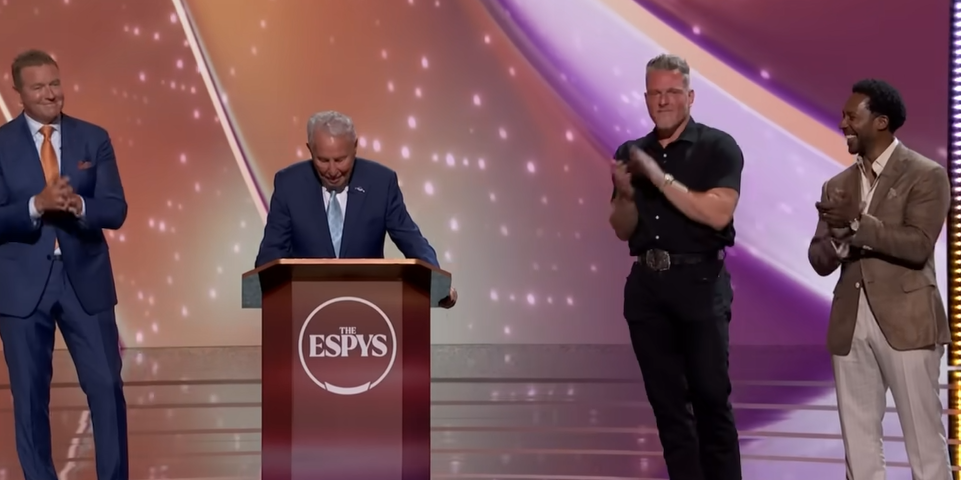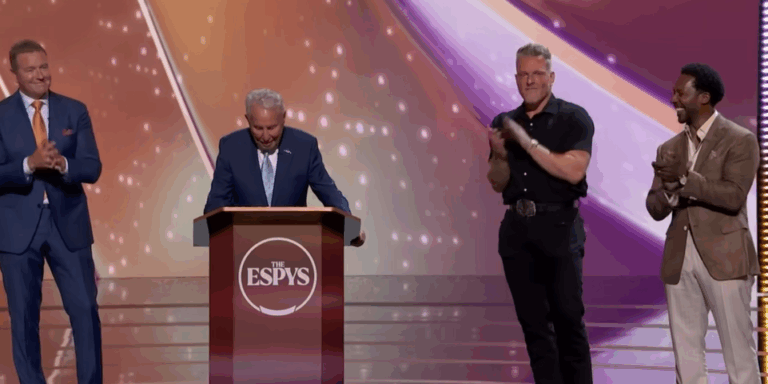For many years, Lee Corso has been the lifeblood of ESPN’s College GameDay, his charisma illuminating campuses full of boisterous students like the sun in the morning. Even at the age of 89, he still lights up television screens, but season after season, his physical presence has raised remarkably similar concerns. Is Lee Corso ill? Although not formally, his medical history conveys a more profound and poignant tale.
A devastating blow to someone whose warmth and wit had always flowed through lively conversation, Corso suffered a stroke in 2009 that temporarily took away his voice and severely diminished his physical capacity. He couldn’t speak for weeks. He had to retrain his speech and movement during months of therapy. Incredibly, he made a comeback to the GameDay set that same year. He stood as a symbol of perseverance, both literally and figuratively, despite being clearly affected.
Corso’s appearances have been interspersed ever since. His absences increased in frequency by 2024, which sparked a wave of conjecture and genuine worry. He was “under the weather” during a brief absence in October 2024, according to ESPN. No other information was disclosed, but his absence was felt strongly. Supporters showered social media with messages, their love flowing in like a steady stream.
Biographical Table:
| Full Name | Lee Richard Corso |
|---|---|
| Date of Birth | August 7, 1935 (Age 89) |
| Place of Birth | Cicero, Illinois, USA |
| Education | Florida State University (BS, MS) |
| Playing Career | Florida State (1953–1957), QB & CB |
| Coaching Career | Louisville, Indiana, Northern Illinois, USFL |
| Broadcasting | ESPN College GameDay (1987–2025) |
| Notable Quote | “Not so fast, my friend!” |
| Family | Married to Betsy Corso, 4 children, 10 grandchildren |
| Retirement Date | Announced for August 30, 2025 |
| Source | Wikipedia – Lee Corso |

What came next was particularly moving. Corso made an appearance on-air while sporting a brain cancer awareness pin. He revealed with obvious emotion that his granddaughter had just had surgery to remove a brain tumor. His vulnerability served as a powerful reminder to the audience that the man behind the mascot helmets is, at his core, a human being and a loving grandfather.
Corso has continued to appear on the show in spite of everything, albeit with limited improvisation and scripted appearances. As a result of the stroke’s impact on his cognitive speed, he now depends on written scripts and rehearsals. Though it flickers instead of blazes, the energy is still present. Still, his trademark line, “Not so fast, my friend,” lands with the same happy punch it always does, and those brief bursts of energy are still adored.
In March 2025, his longtime friend and colleague Kirk Herbstreit gave an incredibly clear update. “He had a stroke about 12 or 13 years ago and really couldn’t speak,” he said, suppressing his emotions. We all asked ourselves, “Will he return?” However, he remains here. A relationship that has been molded and tested over time, based on respect and admiration for one another, was captured in that moment.
The discussion about aging on camera has expanded to include Corso’s health in recent seasons. Sports broadcasting provides room for longevity, in contrast to other industries that quickly retire their icons. Viewers who have grown with Corso over the years will especially benefit from his endurance. In a media landscape that is changing quickly, his ability to adapt rather than vanish has allowed him to stay a mainstay.
The impact of Corso goes well beyond his broadcast persona. His career as a college football coach was characterized by perseverance and tenacity. He led Indiana to a historic victory in the 1979 Holiday Bowl and transformed Louisville into a bowl-winning team. Despite his lackluster coaching record, it showed that he was a man who genuinely cared about the student-athletes he coached.
Corso has used his influence to further charitable endeavors in addition to coaching and television. He has contributed to increasing awareness and funding for pediatric research as an honorary chairman of Coaches Curing Kids’ Cancer. His story is especially inspirational because of his commitment to charitable causes, even while battling personal health issues.
ESPN formally announced in 2025 that Corso would retire on August 30, 2025, following the season’s first GameDay show. It feels like a well-chosen farewell stage, and it will be held in Columbus, Ohio, a city with a long history of GameDay. This final performance is expected to be both heartfelt and joyous, with each cheer probably reflecting the love and appreciation of the audience.
It’s critical to view Corso’s continuous journey as a manifestation of strength via vulnerability rather than as a depressing decline. Even though he is quieter and moves more slowly, his presence is still very potent. By remaining on screen, he normalizes aging and gives viewers a glimpse of how resilience can sometimes whisper gracefully rather than roar.
There are striking similarities to other public figures dealing with health issues, such as Dick Vitale, Michael J. Fox, or even Alex Trebek. All of them serve as a reminder to viewers that where perfection no longer exists, passion frequently endures. That tapestry is a perfect fit for Corso’s story.
He has kept up friendships with famous people throughout his life, including Burt Reynolds, who was his roommate at Florida State. His life was otherwise full of football, but that friendship gave it a Hollywood gleam. And it made him even more human. Fans have come to treasure the warmth and sorrow of Corso’s tribute to Reynolds, which was given when he passed away in 2018.
Corso keeps GameDay feeling like a family get-together, whether it’s by writing mascot selections, making lighthearted jokes about Herbstreit, or giving heartfelt homages. His pencil, held with silent resolve, has come to represent a man who will not be forgotten.
Is Lee Corso ill, then? Officially, no. However, aging causes periods of exhaustion, introspection, and transformation for everyone. All three have been captivated by his televised journey. It doesn’t really matter how fast he speaks or how many shows he does. The important thing is that he continues to appear.


